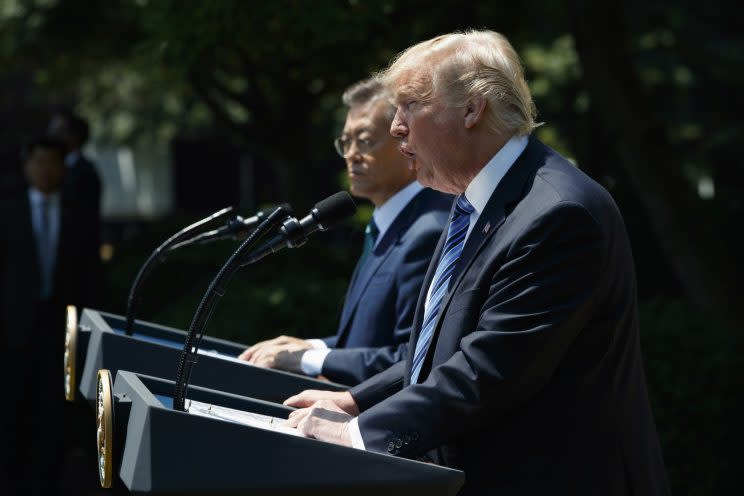Trump vows no more ‘strategic patience’ with North Korea
WASHINGTON — President Trump warned Friday that America’s “strategic patience” with North Korea has run out — a rhetorical escalation amid increasing U.S. pressure on China to rein in its smaller neighbor.
“The era of strategic patience with the North Korean regime has failed. Many years, and it’s failed. And, frankly, that patience is over,” Trump said during a joint appearance in the Rose Garden with South Korean President Moon Jae-in.
Other top officials have sent the same message during the past few months: Secretary of State Rex Tillerson and Vice President Mike Pence both warned during separate trips to Asia earlier this year that the era of “strategic patience” was over. In early June, Defense Secretary James Mattis branded North Korea a “clear and present danger.” In April, a top Trump aide told reporters that “the clock has run out” on decades of diplomatic efforts to corral North Korea.
The steady drumbeat of angry words indicates that the United States has few good options for tackling what was always going to be one of Trump’s severest national security headaches.
Trump’s blunt warning came a week before a meeting in Germany with world leaders that he hopes will help defuse the crisis over North Korea’s nuclear and ballistic missile programs. On the sidelines at a major international summit in Hamburg, Trump will meet with Moon, Russian President Vladimir Putin, Japanese Prime Minister Shinzo Abe and, perhaps most important, President Xi Jinping of China.

“The United States calls on other regional powers and all responsible nations to join us in implementing sanctions and demanding that the North Korean regime choose a better path and do it quickly, and a different future for its long-suffering people,” Trump said Friday. “Our goal is peace, stability and prosperity for the region. But the United States will defend itself — always will defend itself. Always. And we will always defend our allies.”
China is the key to North Korean policy because it’s the smaller country’s patron, its source of food and fuel. Beijing doesn’t want North Korea to collapse, which would potentially send refugees streaming into China, to say nothing of raising doubts about the security of the country’s nuclear weapons. It also doesn’t want North and South Korea to reunite, fearing that the result would be a U.S.-aligned country on its border.
Read more from Yahoo News:


